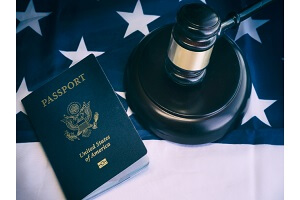A Complete Guide To Family-Based Green Card Eligibility
Green Card, also known as Permanent Resident Card, is a highly sought-after immigration document for individuals who desire to reside and work in the United States. Whether they obtain a green card through a family member or through different ways, it grants them the right to live in the country indefinitely and enjoy several benefits of being a permanent resident.
Individuals with a family member living in the US can consider applying for a Green Card as a viable option. The US immigration system provides provisions for individuals to obtain a Green Card through a family member who is already a US citizen or permanent resident.
This blog will provide a comprehensive overview of the eligibility criteria for obtaining a Green Card through family members living in the US. The topic will be thoroughly explored from the different types of family relationships that qualify for the application process.
What Is A Family Green Card?
 Individuals wanting to work and stay permanently in the US can obtain a Green Card through a family member who is a US citizen or permanent resident through family-based immigration. The US Citizenship and Immigration Services or USCIS oversees the family-based immigration process and provides guidelines for eligibility.
Individuals wanting to work and stay permanently in the US can obtain a Green Card through a family member who is a US citizen or permanent resident through family-based immigration. The US Citizenship and Immigration Services or USCIS oversees the family-based immigration process and provides guidelines for eligibility.
A family-based green card allows individuals to apply for permanent residency in the US through a qualifying family member. The USCIS considers immediate relatives and preference categories when determining eligibility for family-based green cards.
Types Of Family Relationships Qualifying For A Green Card
In the family-based green card process, individuals can apply for a green card through a family member who is a US citizen or permanent resident. The USCIS considers two types of family relationships when determining eligibility for a green card: immediate relatives and preference categories.
Immediate Relatives
Immediate relatives of US citizens receive top priority in the green card application process. According to the USCIS (2021), close relatives include:
- Spouses: A person who is legally married to a US citizen or permanent resident is eligible for a green card as an immediate relative.
- Parents: A biological or adoptive parent of a US citizen who is 21 years of age or older is eligible for a green card as an immediate relative.
- Unmarried Children Under the Age of 21: A biological or adopted child of a US citizen under the age of 21 and unmarried is eligible for a green card as an immediate relative.
Preference Categories
Family members who do not fall under the immediate relative category may still be eligible for a green card through preference categories. The USCIS (2021) lists the following preference categories:
- First Preference: Unmarried children over 21 of US citizens.
- Second Preference: Spouses of permanent residents and unmarried children (regardless of age) of permanent residents.
- Third Preference: Married children of US citizens.
- Fourth Preference: Siblings of US citizens.
The USCIS utilizes a priority date system to determine when a green card application is ready for processing based on the individual’s classification under immediate relatives or preference categories. Those in the close relative category typically have shorter wait times than those in preference categories.
The Application Process for Preference Categories
After determining eligibility for a green card through a preference category, the next step is to complete the application process. The USCIS (2021) outlines the following steps for individuals seeking a green card through a preference category:
File A Petition
The first step in the application process is to file a petition with the USCIS on behalf of the individual seeking a green card through a family member. The petition must be filed by the US citizen or permanent resident sponsor and include evidence of the qualifying relationship and eligibility under the relevant preference category.
Wait For A Visa Number
After the petition is approved, the individual must wait for a visa number to become available based on their priority date. The priority date is established when the USCIS receives the petition and is used to determine when the individual’s application will be processed.
File The Green Card Application
When a visa number becomes available, the individual can file a green card application with the USCIS. The application must include evidence of the individual’s eligibility, including background information and documentation to support the qualifying relationship with the sponsor.
Attend An Interview
Depending on the individual’s case, they may be required to attend an in-person interview with a USCIS officer. The interview provides an opportunity for the USCIS to verify the information included in the application and to ask additional questions.
Receive A Decision
The USCIS will decide on the green card application after the interview. If the application is approved, the individual will receive their green card in the mail. If the application is denied, the individual may have the opportunity to appeal the decision or file a motion to reopen the case.
It is essential for individuals to carefully review the requirements and follow the guidelines provided by the USCIS to ensure a smooth and successful application process. It is also necessary to note that applicants under the preference categories may have to wait a long time before receiving their Green Cards.
Wait Times For Immediate Relatives And Preference Categories
The wait time for a green card through family member sponsorship can vary significantly based on the individual’s relationship with the sponsor and their priority date. The USCIS provides the following wait time estimates for immediate relatives and preference categories:
Immediate Relatives
Immediate relatives of US citizens, including spouses, parents, and unmarried children under the age of 21, are eligible for a green card without any wait time. This means that once the petition is approved, the individual can file the green card application and proceed with the rest of the application process.
Preference Categories
The wait time for individuals seeking a green card through a preference category depends on the preference category and the individual’s priority date. The USCIS provides a monthly visa bulletin with updated wait times for each preference category, which can be found on the USCIS website. For example, as of February 2023, the estimated wait time for individuals in the third preference category (married children of US citizens) ranges from 10 to 23 years, depending on the individual’s priority date and country of origin.
Common Obstacles And How To Overcome Them
Obtaining a green card through family member sponsorship can be complex and involve several steps. Despite careful planning and preparation, individuals may need help with the application process. Some of the most common barriers and how to overcome them include:
Incomplete Or Incorrect Documentation
One of the most common obstacles is applying incomplete or incorrect documentation. To avoid this, individuals should carefully review the USCIS guidelines and requirements for each step of the application process and gather all necessary documentation before filing their application. If there are any errors or discrepancies in the application, the USCIS may request additional information or evidence, which can delay the processing of the application.
Inadmissibility Issues
Individuals may be deemed inadmissible to the US based on factors such as criminal history, prior immigration violations, or health-related issues. To overcome this obstacle, individuals may be required to obtain a waiver of inadmissibility or take other steps to demonstrate their eligibility.
Processing Delays
Processing times for green card applications can vary depending on several factors, including the USCIS workload, the number of applications received, and the individual’s priority date. To avoid processing delays, individuals should ensure that their application is complete and meets all requirements and check the USCIS processing times for the relevant form or application on the USCIS website.
Denial Of The Application
If the USCIS denies the green card application, individuals may have the opportunity to appeal the decision or file a motion to reopen the case. To overcome this obstacle, individuals should carefully review the USCIS decision and any additional requirements or evidence needed to support their case.
With careful preparation and attention to detail, individuals can successfully navigate the green card application process and achieve their goal of obtaining a green card through family member sponsorship. However, despite the best efforts of individuals to overcome the common obstacles in the green card application process, navigating the complex rules and regulations of US immigration law can still be challenging.
This is where the help of an immigration lawyer can make all the difference. The following section will discuss how an immigration lawyer from Lincoln-Goldfinch Law – Abogados de Inmigración can help individuals navigate the green card application process and achieve their goals.
How An Immigration Lawyer From Lincoln-Goldfinch Law – Abogados de Inmigración Can Help
Working with an immigration lawyer can significantly increase the chances of success in the green card application process. An immigration lawyer can provide guidance and support at every stage of the process, from the initial preparation and filing of the application to appeals and motions to reopen in case of a denial.
Some of the specific ways that an immigration lawyer from Lincoln-Goldfinch Law – Abogados de Inmigración can help include:
Review Of Eligibility
An immigration lawyer can help individuals determine their eligibility for a green card through family sponsorship, considering their circumstances and family relationship. The lawyer can also advise on potential inadmissibility issues and guide how to overcome them.
Preparation Of Application
An immigration lawyer can assist with preparing the green card application, ensuring that all required forms and documentation are complete and accurate and the application meets the USCIS guidelines and requirements.
Representation In Interviews
An immigration lawyer can represent individuals during any USCIS interviews or in-person appointments, providing support and guidance to help ensure a successful outcome.
Monitoring Of Processing Times
An immigration lawyer can keep track of the processing times for the individual’s green card application and provide updates on any changes or developments in the USCIS processing times.

Appeal And Motions To Reopen
In the event of a denial of the green card application, an immigration lawyer can assist with the appeals process and represent the individual in filing a motion to reopen the case.
An immigration lawyer from Lincoln-Goldfinch Law – Abogados de Inmigración can be a valuable asset in the green card application process. With dedicated support and guidance at every step, navigating the complex rules and regulations of US immigration becomes easier.
An immigration lawyer can help determine eligibility, ensure that all required forms and documentation are complete and accurate, provide representation during USCIS interviews, track processing times, and offer guidance on appeals and motions to reopen in the case of a denial. Choosing to work with an immigration lawyer can increase the chances of success in obtaining a green card through family member sponsorship.
Contact A U.S. Immigration Attorney Today!
Categories
How To Find Us
What Our Clients Say
“This Lawfirm is great, very professional and helpful. I love that they are always in communication and always available for when you have questions . 100% recommended by me and my family. Thank you Lincoln-Goldfinch Law – Abogados de Inmigración”





